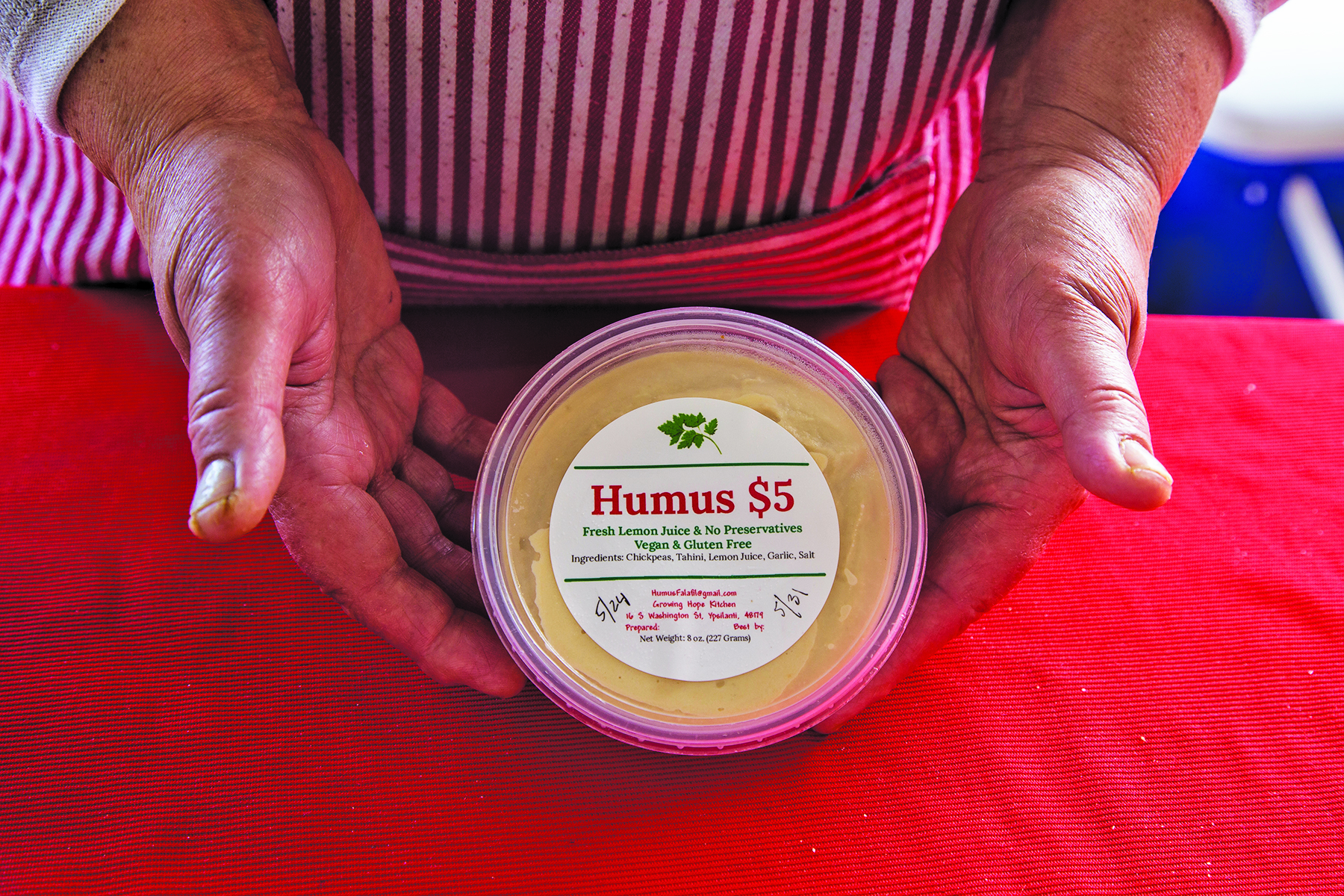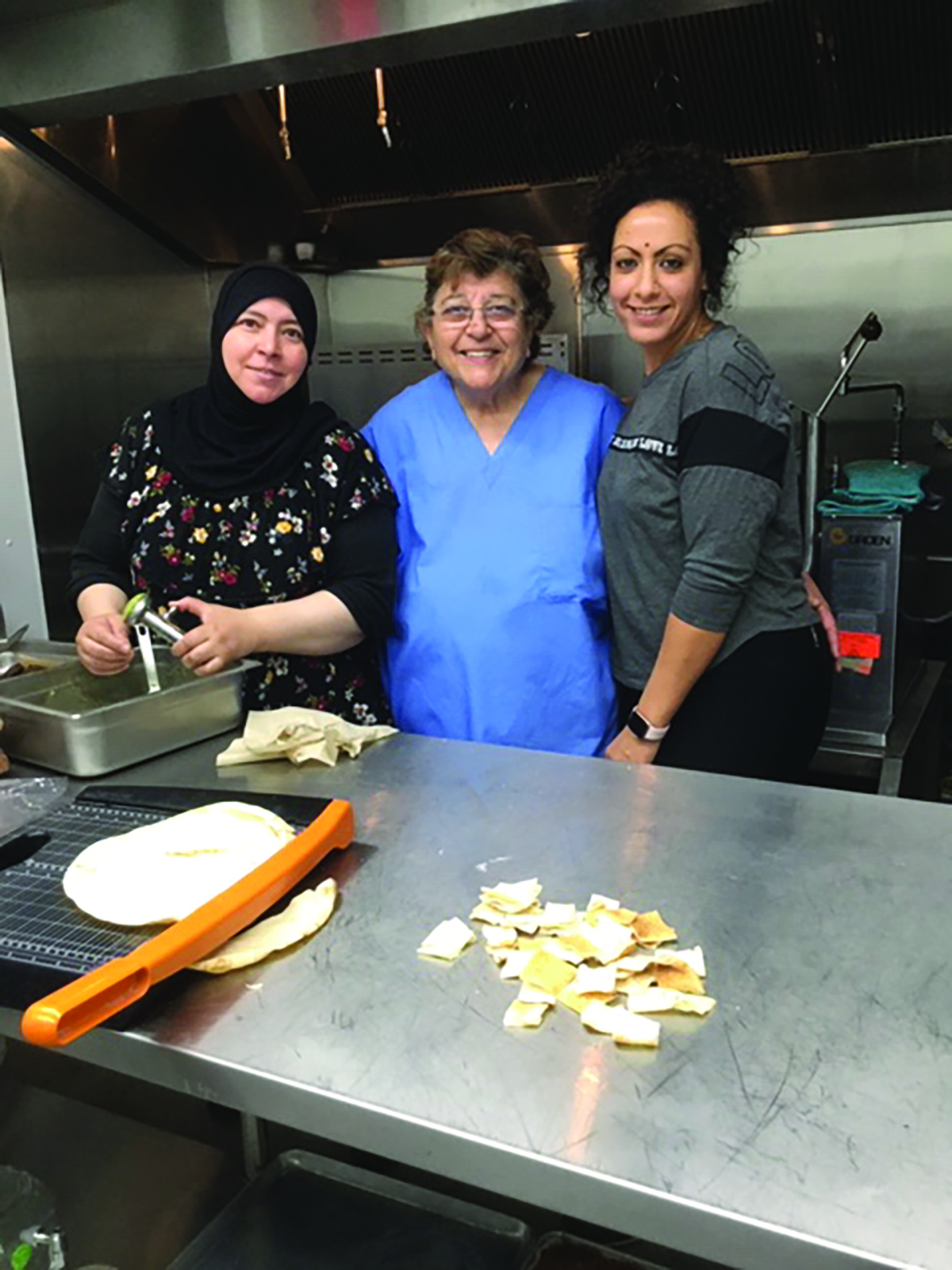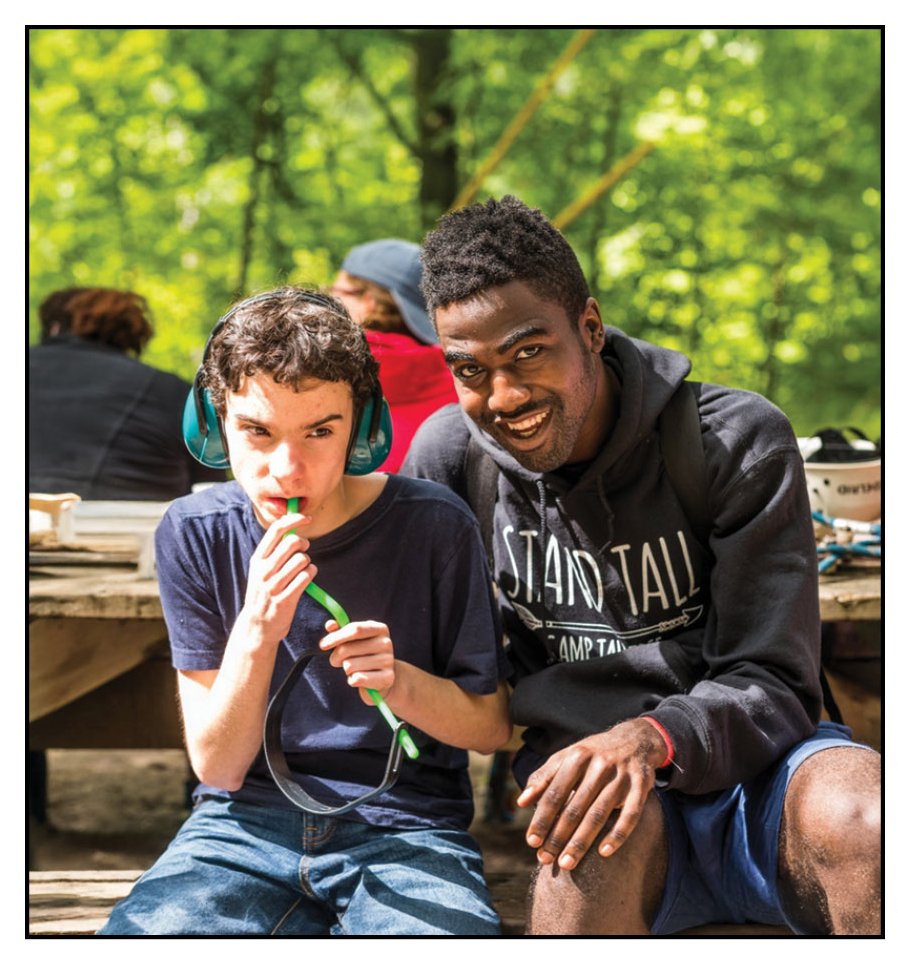By Angela Madaras, Photography by Fresh Coast Photography
My first bite of Middle Eastern gastronomy was around age fifteen. There was a lovely Lebanese woman in her seventies who owned a food cart in a small shopping mall. She made her falafel like giant vegetable burgers with hearty chunks of chick peas, tahini, fresh parsley, garlic, lemon, and other magical ingredients she had in her secret stash. She would not share her ingredients or recipes with me except explaining a little cultural background and what basic ingredients went into her tasty street food. Her kibbhe was not the traditional raw ground lamb though. She instead baked finely minced lamb and seasonings into a square patty that was quite thin and crispy. I cherished her food. I later found out she was an aunt of one of my friends.
Flash forward to present day. Ferial Rewoltd is also Lebanese, in her seventies, and owns a similar food stand and wholesale business selling traditional gastronomic delights infused with her own unique flare of food from a variety of Mediterranean countries. I stumbled upon her at the Ann Arbor Farmers Market three years ago. She offered me a sample and began explaining what I tasted. Her energy was exuberant and infectious; she had enormous warmth about her that resembled the chef from my past, yet Rewoltd’s food was completely different. She not only serves traditional Lebanese cuisine, but also mixes in Italian, Turkish, Greek, and Syrian for her own blend of a cultural collision. It is reminiscent of our own American melting pot. During our time together, Rewoldt taught me the importance of sharing our culture through food and old fashion face-to-face conversation. Think of the many current issues that we could solve if only we sat down at the table over a meal and respectful communication!
After my first encounter with Rewoltd’s business she calls “HumusFalafil,” I read a profile of her in The Ann Arbor Observer, written by John Hilton, highlighting her special food. I asked John for a quote, as he is one of her biggest fans, to which he exclaimed:
“She impressed me first with her determination, resolutely bundled against the cold at the winter market. Then I discovered that her warming tray held the best spinach pie I'd ever had. And then I found she was a born teacher, delighted to explain just what makes her spinach pie different (three different cheeses! nutmeg!), and where muhamara comes from in Syria, and why its flavor is so deep and complex (roasted peppers! walnuts! pomegranate molasses!). I was impressed, too, at her clear thinking about the business of selling at the market—pricing almost everything at $5 to make change-making easy, introducing new things, and always, always, welcoming and teaching new customers.
She made my Saturdays happier! When my car unexpectedly needed a major repair last weekend, I ended up walking home several miles, thinking all the way about stopping at the market for a spinach pie. I did, and it was every bit as good as I'd imagined it.”
My conversations with Rewoldt took place over several visits to her winter pop-up at Argus Farm Stop, and many emails, and during a two-hour interview where I also met her adoring son, Joseph. We jokingly said this article should be titled “Driving Miss Ferial” since Joey spent his day driving her around, as her husband usually does, delivering goods and buying food for a day of preparation.
Angela Madaras: Ferial, can you explain to our readers your professional and cultural background, and how you came into the food business three years ago?
Ferial Rewoldt: I grew up in Lebanon in a small city called Jounieh on the Mediterranean Sea north of the capital city, Beirut. I am the third child in a family of four. As a young adult I moved to Beirut where I graduated from the American University of Beirut with a Bachelor of Science in Nursing. I practiced for a few years at the University’s Medical Center. Since my intention was to become a teacher, I continued my higher education in the field of Educational Psychology. It was then that the Lebanese Civil War broke out and disrupted normal life for many years.
During that period, I met an American woman from Toledo, Ohio named Donna Shaya who was married to a Kuwaiti gentleman. She was also studying at the American University of Beirut. We both were the same age and both nurses.
She was very kind to apply on my behalf for a nursing job at the Toledo Medical Center. Once she received the acceptance of employment, she applied and sponsored me to immigrate. Upon being granted the immigration visa, she guided me as to what to do after arriving in the U.S.A., which happened in June of 1976. Her family in Toledo was also generous to guide me as I settled down and started work. They taught me a big lesson in generosity and caring for people without any expectations in return.
By the end of that summer I moved to Detroit to attend the Masters of Nursing program at Wayne State, and after that, attended the School of Public Health at the University of Michigan. I then started working part time, then full time as a Registered Nurse at the University of Michigan Medical Center until I finally retired 30 years later in 2011.
After retiring I did what retirees usually do: frequent visits with family, working out at the gym, and biking, traveling, attending cultural and musical concerts. Five years later, in 2016, I sent an email message to the manager of the Chelsea Farmers Market, Stephanie Willette. I asked if Mediterranean food is of interest to the market. Stephanie was kind enough to invite me to be a vendor and mentored me through the process. In general my menu includes: Hummus, Baba Ghanouge, Italian Spinach-Cheese Pie, Egyptian Falafil Sandwiches, Lentil Soup, Syrian Muhammura, Garlic Dip, Garcinia Tea, and Tahini Brownies. We are into using Tahini whenever possible. In the summer I add a cold herb drink and Manakish, which is an herb pie, or flatbread sprinkled with Zaatar (thyme, sumac, and sesame seeds).
Angela Madaras: Can you explain why you spell falafel and hummus differently than it is usually spelled? And how did you come by the name for your business?
Ferial Rewoldt: In 2016 when I started this business I intended to focus on humus and falafil, two very popular foods in southeastern Michigan. I thought focusing on these two names would allow customers to easily identify what I am trying to provide them. I had the customer in mind. I wanted to facilitate their experience interacting with me. Since then, I have tried to come up with a more professional name, but “HumusFalafil” has a certain ring to it despite its goofiness. I ask for recommendations for a new name and many suggest using my personal name.
Knowing English grammar, I knew the reason Hummus has two M’s between the two vowels. I thought removing one M won’t change the pronunciation or the meaning of the word but allows for less clutter on the banner I used. That banner has since been replaced. Falafil on the other hand can be spelled with “i” or “e” in the later part of the word… and now I’m stuck with it.
AM: Do you have staff helping you? For our readers would you mind sharing your age? I find your stamina to be most inspirational for any age. It is you, and those of like mind, who can teach people that life can be vibrant and fulfilling at any age, and that it is never too late to pursue joy and start a business from the passion and love for one's craft or talent.
FR: Right now, I get support from my son, my niece, my husband, and a few other family friends who chip in a few hours here and there to help me carry the load. I’ll have to hire more full-time employees if my business continues to grow.
I am 72-years-old. I find myself thinking I am lucky to be involved in this business after retirement. I meet people and enjoy their company, and I feel very lucky to be a part of the Farmers Market Community. My husband Jeff was kind to tell me that the criterion for continuing this work is simply to “have fun.” So far I love what I am doing. The commitment to this community keeps me from quitting on tough days!
My husband thought I was crazy when I first told him I wanted to pursue this project. I don’t know if my kids felt that way. My older son, Joseph, politely asked me if I am making any money. Based on the “I am not sure” answer I gave him he took the time and energy to analyze the work in detail and advised me as to which items had to go off the menu or raise prices. One of those items is Muhammura. I could not slash the item off the menu based on what the customers told me. They loved it. Disappointment is expressed frequently when I run out of it! So it is still being offered. My husband is very supportive. He drives me to the market and helps with setting up the tent, tables, and banners. He has learned not to leave until I give the thumbs up, indicating we have not forgotten anything and I am good to go for the day. I often interact with him via email in case I need things during market days. He dutifully drives to deliver the items I need. I am lucky we live in Ann Arbor about two miles away from the market. My son, Joey, has been more than generous. He spends periods of time actively getting me organized and planning to take this business to the next level.
AM: You are pretty famous for educating your customers about the food you make, its cultural significance, and sometimes sharing recipes. Would you consider teaching a cooking class? And is there a reason we should be mindful of preserving our cultural heritage and recipes for future generations?
FR: Educating my customers about the food I prepare is based on my belief that some of these foods are “foreign” to some Americans. Even the hummus, which is very popular. I find people not knowing how essential tahini versus olive oil is to its preparation. Another factor behind the education I do is my conviction to tell customers a story around the food that will engage them and make it more appealing. I address the geographic location of each items origin. As for the Italian Spinach Pie, I tell customers the differences between it and the Greek version.
Muhammura is a very interesting dip. Its origin is Aleppo, Syria (according to Wikipedia). I always start with dry ingredients to facilitate the work of the food processor. So I start with garlic, walnut, breadcrumbs, cumin, and red pepper. Once those are mixed I add roasted red pepper, pomegranate molasses, lemon juice, and olive oil. The end result is a rich dip from olive oil and walnut, slightly sweet from the molasses, and a bit of kick at the end from the cumin and red pepper. I usually have a sample for customers to try. After I point out the presence of breadcrumbs for those needing gluten-free diet and walnut for nut allergy, I proceed to alert people about the hot kick that they tasted at the end.
I say: Are you ready for a kick? With laughter and fun a sweet interaction takes place. Over the last two years the customers buying Muhammura have expanded its use from a dip to a sandwich spread and an accompaniment to oriental rice.
The first year I started in Ann Arbor I used to have a young man ride his bike to the market and buy a Spinach Pie. Most of the time he would eat it before riding his bike again. I got to know him well. He was a PhD student in Mathematics at Michigan. He loved to cook. He ground his own flour in his apartment! On one occasion I noticed him smelling the pie before biting into it and for a while his eyes were fluttering. Prior to leaving town for a post doc on the East Coast he expressed interest in learning how to make the Spinach Pie. He ended up coming to my house where I coached him to make a tray of these pies and bake it. He took it to a group party the next day. Another customer from the area of Brighton also expressed interest in learning to make the pie. She ended up at my house with her daughter and adorable grandchildren. We all got into the making of two trays they brought with them. I would love to teach making hummus, grape leaves, and spinach pie. Sharing our cultural heritage is what makes this wonderful “melting pot” experience we are part of in the U.S.A..
AM: What are your future business goals?
FR: My main goal can be summarized in the word “expansion.” I would like my dreams to continue even after the time when I can’t continue to work. So, providing hummus and other Mediterranean dishes such as baba ghanouge and pesto as fresh as possible with no preservatives would be a great accomplishment in our new world. Another goal would be to provide the same current menu to more residents of Ann Arbor, and beyond, in a venue that includes a drive thru. It’s time to join other entities that provide such possibility. The goal would be to do that without compromising the quality of the food. A third dream is to find local suppliers of the main ingredients.
AM: Is there anything you would like to share with the readers we did not cover?
FR: So far, I have spent three years working on this project. I always try to at least break even financially. The initial financial investment I made solely on my own has been at times challenging. I have heard a number of times my son saying: “If you can’t make profit, shut it down.” I definitely think it’s a great challenge to start a business. I know of a number of talented people who would like to start one, but are concerned over the finances. I am grateful for the encouragement and guidance of all who have helped me get to this point.
Visit with Ferial Rewoldt at the Ann Arbor Farmers Market on Wednesday and Saturday, or find her on Facebook @humusfalafil. She sells her goods at both Argus Farm Stop locations and does a pop-up lunch every Thursday at their Packard Street location. You can also find hummus and baba ghanouge at the Sparrow Meat Market in Kerrytown.

































































































































































































The birds are exuberant this morning. By the dozens, tufted titmice, rose-breasted grosbeaks, cardinals, gold finches, black capped chickadees, blue jays, mourning doves, and an oriole sing and flit from branch to nearby branch in a riotous clamor just outside the living room windows. One of the delights of spring is the way one can luxuriate in the bookends of the day. Morning unfolds slowly as the light gathers until the sun crests the horizon, and then all at once the day bursts open like a flower. Evening lingers before the day finishes. It is at these times that I especially enjoy watching the birds come and go.